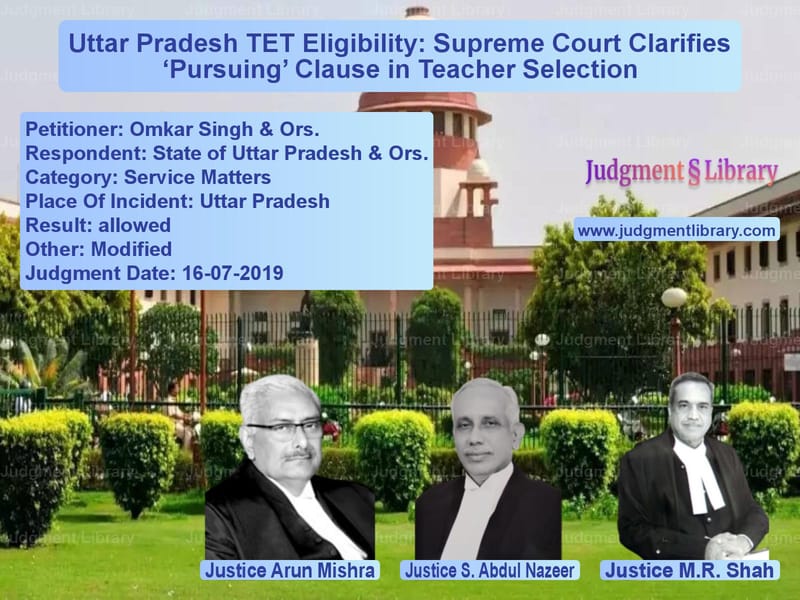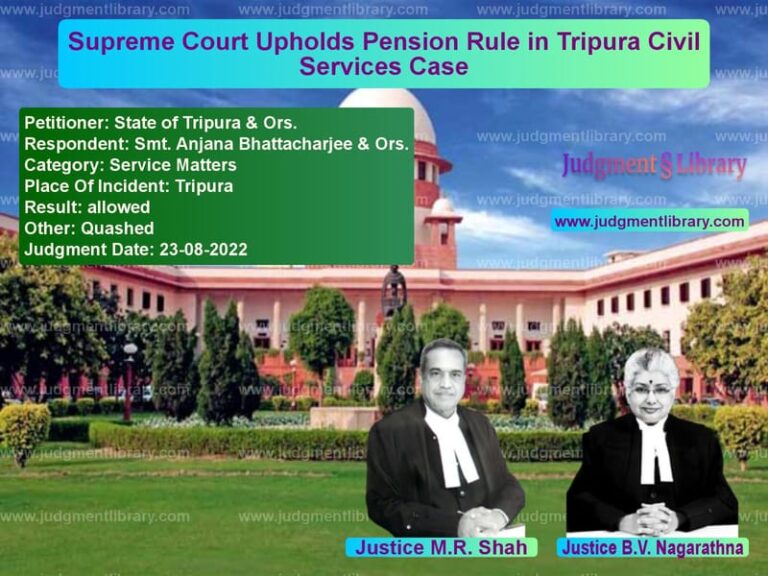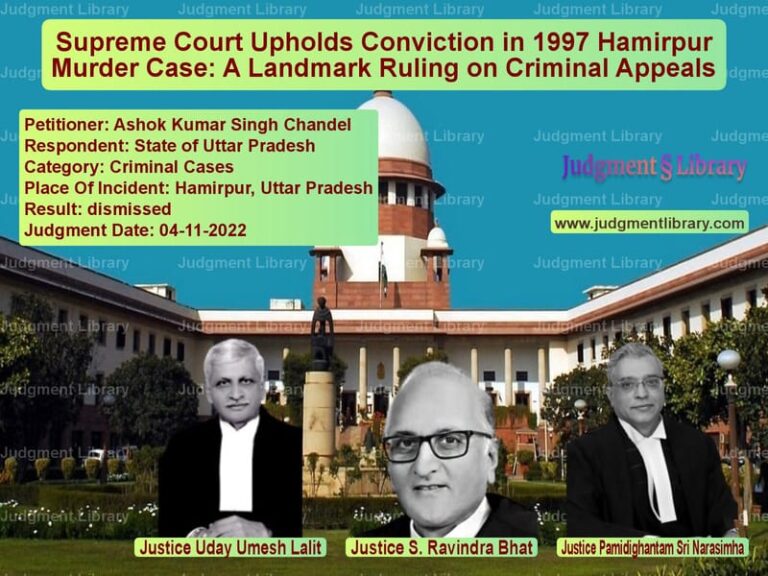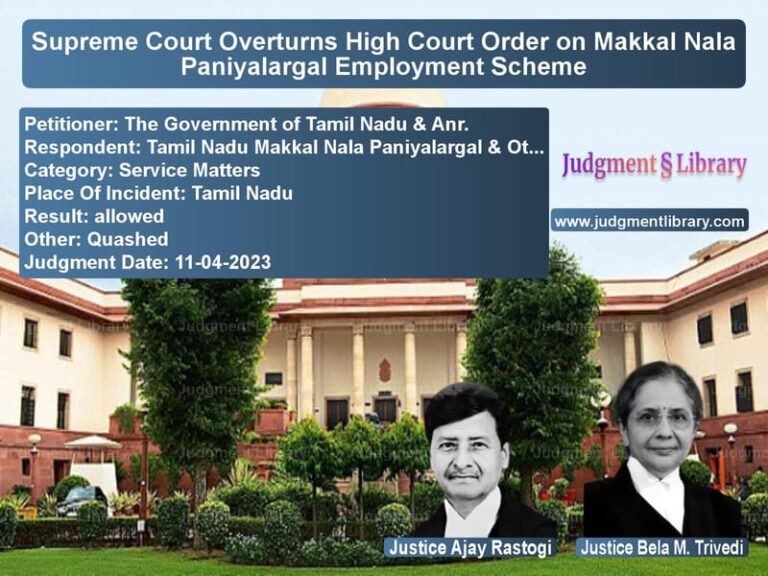Uttar Pradesh TET Eligibility: Supreme Court Clarifies ‘Pursuing’ Clause in Teacher Selection
The case of Omkar Singh & Ors. vs. State of Uttar Pradesh & Ors. is a significant ruling concerning the eligibility criteria for candidates appearing in the Uttar Pradesh Teacher Eligibility Test (UPTET). The Supreme Court set aside the Allahabad High Court’s decision, ruling that candidates ‘pursuing’ teacher training courses (TTC) were eligible to appear for the UPTET examination.
The dispute revolved around the interpretation of the word ‘pursuing’ as mentioned in the National Council for Teacher Education (NCTE) guidelines. The High Court had imposed additional restrictions, stating that only those candidates who had completed their exams but whose results were pending could appear in UPTET. The Supreme Court ruled that any candidate who was actively ‘pursuing’ a recognized training course at the time of the examination was eligible.
Background of the Case
The key events leading to the legal dispute are as follows:
- The Government of Uttar Pradesh issued a notification allowing candidates pursuing teacher training courses (TTC) to appear for UPTET.
- Following this, multiple candidates, who were in the process of completing their TTC, applied for the examination.
- The UPTET was conducted on November 13, 2011, and the results were declared on November 25, 2011.
- Subsequently, recruitment for 29,334 Assistant Teacher posts was announced, and eligible candidates, including those who had passed UPTET, were appointed.
- In 2017, a group of petitioners challenged the recruitment process, arguing that candidates who had not completed their TTC at the time of appearing for UPTET should not have been allowed to take the exam.
- The High Court ruled in favor of the petitioners, stating that only candidates who had completed their exams but whose results were pending could have appeared.
- The affected teachers appealed to the Supreme Court, challenging the High Court’s decision.
Petitioner’s Arguments
The appellants, represented by legal counsel, raised the following arguments:
- The interpretation of the term ‘pursuing’ in the NCTE guidelines should include all candidates actively enrolled in TTC, regardless of whether their final exams had been conducted.
- The additional restrictions imposed by the High Court were not supported by the plain reading of the NCTE guidelines.
- The government order issued on May 15, 2013, had already clarified that candidates in the final year of TTC were eligible to appear for UPTET.
- The High Court’s decision, if upheld, would unfairly invalidate the appointments of thousands of teachers who had followed due process.
- The principle of legitimate expectation and equity must be applied to protect those candidates who acted in reliance on the government’s notification.
Respondent’s Arguments
The petitioners who challenged the recruitment process countered with the following points:
- The term ‘pursuing’ should be narrowly interpreted to mean only those who had completed their coursework and were awaiting results.
- Allowing all candidates still in their training program to appear in UPTET would dilute the standard of teacher recruitment.
- The government’s modification in 2013 could not retrospectively validate the UPTET results of 2011 and 2012.
- The High Court correctly ruled that only those who had appeared for their final exams and were awaiting results should have been allowed to take the UPTET.
Supreme Court’s Observations
The Supreme Court bench, comprising Arun Mishra, S. Abdul Nazeer, and M.R. Shah, examined the legal interpretation of the term ‘pursuing’ in the NCTE guidelines. The Court made the following observations:
- The term ‘pursuing’ must be understood in its plain grammatical sense, meaning any candidate who is actively enrolled in a recognized teacher training course.
- The High Court’s interpretation was unduly restrictive and had no basis in the language of the NCTE guidelines.
- It was incorrect to exclude candidates merely because they had not yet appeared for their final exams.
- The principle of fairness required that candidates who acted in good faith based on government notifications should not be unfairly disqualified.
Critical Judgment Excerpt: “Looking to the clear wordings in clause 5(ii) of the NCTE guidelines and the phrase used ‘pursuing’, the High Court is not justified in adding additional riders. A candidate who has been admitted in any of the TTC and undergoing the teacher training course can be said to be ‘pursuing’ such a course and shall be eligible to appear in the TET examination.”
Final Decision
The Supreme Court ruled in favor of the appellants and allowed the appeal:
- The High Court’s restrictive interpretation of ‘pursuing’ was set aside.
- Candidates who were enrolled in a recognized TTC at the time of appearing in UPTET were deemed eligible.
- The appointments of the affected Assistant Teachers were upheld.
- The ruling affirmed that fairness and legitimate expectation must guide the interpretation of eligibility criteria.
Implications of the Judgment
This ruling has significant implications for teacher recruitment in India:
- Clarifies that the term ‘pursuing’ in eligibility criteria includes candidates actively enrolled in a course, irrespective of whether they have appeared for final exams.
- Protects the employment of thousands of teachers who had been appointed based on earlier interpretations of the eligibility criteria.
- Establishes that courts should not impose additional conditions beyond the plain language of eligibility guidelines.
- Sets a precedent for similar cases concerning recruitment and eligibility disputes in education and other government sectors.
The Supreme Court’s decision in Omkar Singh vs. State of Uttar Pradesh ensures that legitimate expectations of candidates are honored and prevents arbitrary disqualification based on restrictive interpretations of eligibility criteria.
Petitioner Name: Omkar Singh & Ors..Respondent Name: State of Uttar Pradesh & Ors..Judgment By: Justice Arun Mishra, Justice S. Abdul Nazeer, Justice M.R. Shah.Place Of Incident: Uttar Pradesh.Judgment Date: 16-07-2019.
Don’t miss out on the full details! Download the complete judgment in PDF format below and gain valuable insights instantly!
Download Judgment: Omkar Singh & Ors. vs State of Uttar Prade Supreme Court of India Judgment Dated 16-07-2019.pdf
Direct Downlaod Judgment: Direct downlaod this Judgment
See all petitions in Recruitment Policies
See all petitions in Judgment by Arun Mishra
See all petitions in Judgment by S. Abdul Nazeer
See all petitions in Judgment by Mukeshkumar Rasikbhai Shah
See all petitions in allowed
See all petitions in Modified
See all petitions in supreme court of India judgments July 2019
See all petitions in 2019 judgments
See all posts in Service Matters Category
See all allowed petitions in Service Matters Category
See all Dismissed petitions in Service Matters Category
See all partially allowed petitions in Service Matters Category







